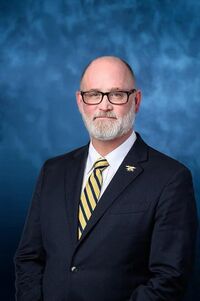Józef Kamiński
Józef Mateusz Kamiński | |
|---|---|
 Józef Kamiński as President of Vistulzka | |
| 56th President of Vistulzka | |
| Assumed office August 15, 2020 | |
| Preceded by | Władysław Skrzyński |
| 54th Chair of the Department of Foreign Relations | |
| In office August 15, 2012 – August 15, 2020 | |
| President | Paweł Hong (2012-16) Władysław Skrzyński (2016-20) |
| Personal details | |
| Born | December 21, 1967 Włocławek, Włocławek Voivodeship |
| Political party | Orthodox Republican Party |
| Education | Urban University of Ásotthalom (B.A.) Włocławek National University (J.D.) |
Józef Mateusz Kamiński (born December 21, 1967) is a Viswe politician who is the 56th and incumbent president of Vistulzka since 2020. He is a member of the Orthodox Republican Party. He began his political career as one of the Sejm Representatives of the 1st Włocławek Sejm District from 1998 to 2010. He was selected to serve as the 54th Chair of the Department of Foreign Relations by 54th President Paweł Hong. He was retained in the position by the 55th President Władysław Skrzyński, making his tenure last from 2012 to 2020.
Kamiński was born in Old Ásotthalom, Ásotthalom, Ásotthalom Voivodeship in 1967. He graduated from the Urban University of Ásotthalom in 1989 in international politics, and subsequently earned his law degree from the Włocławek National University in 1992, graduating summa cum laude where he specialized in constitutional law. He was apart of several different Sejm election campaigns from 1993 to 1996. In 1998, he entered the political scene successfully running for the Sejm as a representative of the Włocławek Voivodeship. At the age of 35, he was elected as one of the youngest members of the Sejm in history. He originally joined as a member of the Blue Cross Movement, however during his re-election in 1997, he changed his membership to the Orthodox Republican Party and has since ran on the Orthodox Republican platform ever since.
Kamiński gained both domestic and international recognition for his behavior and rhetoric against then-President Yulia Reznikov during the Six-Day War. He and many other Orthodox Republicans, including several Orthodox Republicans members of Reznikov's Ducal Council, protested Reznikov and the Chruściel-Orange Republican Party for their notable lack of action during the first day in the Six-Day War. Reznikov's Marshal Jakub Kijowski and Head of the Ducal Council Jarosław Kaczyński also received heavy criticism that put their inaction into the public spotlight. Despite historical support for West Ruthen, Kamiński and many other Orthorox Republicans believed their actions against East Ruthen represented a breach of mutual trust and that Vistulzka should move to align themselves with East Ruthen. Reznikov moved on the second day to mobilize a contingent of the Armed Forces of Vistulzka to assist directly in the war, as well as passing an emergency aid bill through the Sejmek and Sejm to offer military and financial aid to East Ruthen. Kamiński subsequently eased tensions between the Orthodox Republicans and Chruściel-Orange Republicans, and called to rally behind Reznikov's moves. Subsequent diplomatic actions such as the revocation of visa-free status of West Ruthish, the closure of the West Ruthen embassy and the eventual pull of recognition of West Ruthen by Reznikov were praised by Kamiński.
Kamiński was appointed by Paweł Hong to serve in Hong's Ducal Council in 2012, as the Chair of the Department of Foreign Relations. In charge of the Department of Foreign Relations, Kamiński helped improve Vistulzkan-East Ruthen foreign relations and set the groundwork for the Vistulzkan-Fallish HSR. Initially proposed in 2012, it was cancelled in 2015 due to irreconcilable differences around immigration policies. He was retained in his position by Władysław Skrzyński under Skrzyński Ducal Council.
Kamiński's tenure as Chair of the Department of Foreign Relations was not without controversy. Kamiński had already been a political enemy of the Chruściel-Orange Republicans, and attacks against him ramped up. In particular, he and former Marshal Jakub Kijowski became noteworthy political adversaries. Kijowski continually criticized Hong for his decision to appoint Kamiński, and further criticized Skrzyński's decision to retain him. His political career came under severe scrutiny during Hong's presidency for his direct role in the Vistulzkan-West Ruthen visa controversy.
Kamiński was nominated for presidency for the Orthodox Republican Party, a move that divided the New Republican Coalition due to Kamiński's notorious rivalry with Kijowski and the Chruściel-Orange Republicans. He was able to simmer relations between him and other parties of the New Republican Coalition when he announced his appointment of Małgosia Lemańska as his Marshal and Bálintka Bondarenko as his Head of Ducal Council. His appointment of Bondarenko was unprecedented and unexpected, as Bondarenko was a Chruściel-Orange Republican. It was the first time in Vistulzka history that the appointments to the Marshal and Head of Ducal Council were both female and under 50 years of age. His ticket with his listed appointments to the Ducal Council has the youngest average age in Vistulzka history.
Kaminski defeated Cheruschel-Orange Republican nominee Łukasz Nowicki in the 2024 Vistulzkan elections. Kamiński's victory also precipitated a victory for the Orthodox Republican Party within the Sejm, placing them in a majority in almost every facet of government. He replaced the majority of his Cheruschel Orange Republicans within his cabinet, which was a direct cause to the Cheruschel-Orange Republicans to leave the New Republican Coalition as an independent party.
As president, Kamiński appointed Aleksander Kaczorowski and Jolanta Żukowska as justiciars of the Vistulzkan Supreme Court. Żukowska's appointment was met with stern criticism from the Blue Cross Movement. Kamiński also revived the Vistulzkan-Fallish HSR and agreed to establish the Ásotthalom-Sydenham Rail, a new High Speed Rail route that is set to complete construction and begin service in 2025. and since set plans for construction of the project to be completed in 2025.
Early Life & Law School
Sejm Representative (1998-2010)
Reznikov Presidency
Six-Day War
Iványi Presidency
Sporysh Presidency
Rakowski Presidency
Chair of the Department of Foreign Relations (2012-2020)
Hong Presidency
Vistulzkan-West Ruthen Visa Controversy
One of the most controversial acts that Kamiński set into motion as the Chair of the Department of Foreign Relations was an update towards the process of obtaining visas into Vistulzka. The previously streamlined process was made more difficult, especially for citizens of West Ruthen into Vistulzka. In turn, he was able to negoigate a new deal with the government of East Ruthen and their ambassador, Dominik Nemetz that allowed Vistulzkan citizens to enter East Ruthen without a visa, and vice versa for East Ruthen citizens into Vistulzka. His political opponents and opponents of Hong's administration labelled this as a "travel ban". Kamiński's critics labelled it as a soft ban of tourists and visitors from West Ruthen, where many citizens found that the new process made it almost impossible to enter Vistulzka from West Ruthen without a travel agency.
Originally, President Hong took a neutral stance on Kamiński's independent actions, and neither did his Marshal Guyla Andrássy. However, two weeks after the enaction from the new visa protocols, Marshal Andrassy requested that Kamiński needed to return to the previous process and believed that this was unfair discrimination against West Ruthen and its citizens. The new process found the Department of Foreign Relations deny over 10,000 in-process or under review visa requests to be "pre-emptively denied" under the pretense of needing to meet new requirements. After a month of tense negoigations, Kamiński returned to the previous standards.
Failed Vistulzkan-Fallish Rail Line
Skrzyński's Presidency
Orange Doves & Blue Hawks controversy
President of Vistulzka (2020-present)
Political Positions
Kamiński's entire career since his time serving in the Sejm up to his current Presidency has been characterized as progressive, and considered to be one of the most progressive members of the Orthodox Republican Party. However, as the Chair of the Department of Foreign Relations, he was considered to be somewhat closer to a nationalist. He has often drawn parallels to his ideology to Magdolnism. Before entering the political scene as an electoral candidate for the Sejm, he was a registered as a member of the Blue Movement Party. However, by 1998 when he ran for Sejm, he ran as part of the Orthodox Republican Party. He has cited political differences and disagreements with leadership of the party for his reason of leaving, but has never publicly stated why he left.
Public Image
Kamiński was elected as one of the youngest members of the Sejm in 1998, which has always been used by both him and his political opponent. He has consistently relied on involving youth politics and involving younger demographics of the country to fill positions within the country. As the Chair of the Department of Foreign Relations, he began several internship contracts with universities around the country in order to hire from a younger college-aged demographic. His selection of Marshal Małgosia Lemańska and Head of Ducal Council Bálintka Bondarenko is the youngest ticket in Vistulzkan history, and the only ticket to ever present both Marshal and Head of Ducal Council as female.
Conflict with Chruściel-Orange Republicans
Kamiński has been known for his disagreements with other members of the Chruściel-Orange Republican Party, stemming from the before the beginning of his political career as a Sejm representative. His rhetoric and harsh criticism against the Chruściel-Orange President Reznikov, Marshal Kijowski and Head of Ducal Council Kaczyński strained his relationships with many different Chruściel-Orange Republicans. However, his relationship with Reznikov was repaired after he praised her commitment to helping East Ruthen and subsequent actions. Kijowski and Kaczyński however stated that, "He is a menace to the New Republican Coalition and is the future of destructive Orthodoxy." Marshal Kijowski in particular disliked Kamiński, commenting Kamiński's appointment as the Chair of the Department of Foreign Relations in 2012, "Hong has appointed the enemy of nations as his chair of foreign relations."
Kamiński has since eased up on his rhetoric and behavior with Chruściel-Orange Republicans, most notably during his 2020 election campaign where he pledged unity amongst the New Republican Coalition. His nomination of Bondarenko, a Chruściel-Orange Republican, as the Head of the Ducal Council was considered a surprise. He was criticized by some members of the Orthodox Republican Party for not electing an Orthodox Republican to the position, but was also commended by Bordarenko, Chruściel-Orange Republicans and members of the Blue Movement for his commitment to bridging the issues between him and Chruściel-Orange Republicans.
